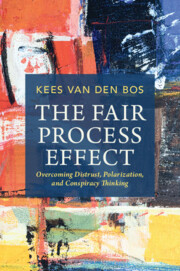Book contents
- The Fair Process Effect
- The Fair Process Effect
- Copyright page
- Contents
- Preface
- Acknowledgments
- Part I Introduction
- Part II Perceiving Procedural Fairness
- Part III The Fair Process Effect
- Part IV Examining Societal Discontent
- Chapter 6 Distrust
- Chapter 7 Polarization
- Chapter 8 Conspiracy Thinking
- Part V Overcoming Societal Discontent
- References
- Index
Chapter 7 - Polarization
from Part IV - Examining Societal Discontent
Published online by Cambridge University Press: 26 October 2023
- The Fair Process Effect
- The Fair Process Effect
- Copyright page
- Contents
- Preface
- Acknowledgments
- Part I Introduction
- Part II Perceiving Procedural Fairness
- Part III The Fair Process Effect
- Part IV Examining Societal Discontent
- Chapter 6 Distrust
- Chapter 7 Polarization
- Chapter 8 Conspiracy Thinking
- Part V Overcoming Societal Discontent
- References
- Index
Summary
Chapter 7 examines the detrimental effects that polarization between different groups can have on individuals, groups, communities, and societies. The book thereby contrasts itself with positive perspectives on polarization and conflict in society. One important aspect that may start important instances of group polarization is how to respond to dissenting opinions, and the affective and defensive responses dissenters may trigger. Fairness concerns come with an important dark side. For example, people may go to great lengths to protect their views that they live in fair and just societies and that their group and culture are involved in what is morally right. Indeed, desperately wanting to be involved in what is morally pure can strengthen important aspects of group polarization in our modern society. This is especially the case when groups have clear group boundaries, involve some form of (authoritative or moral) direct leadership, and when group members think their tribe is fighting for a worthy moral cause. Thinking of individuals as members of other groups in abstract terms facilitates enemy thinking between different groups. People tend to adhere more to fairness principles when they act out of their own individual responsibilities than when they feel responsible to defend their group interests.
Keywords
- Type
- Chapter
- Information
- The Fair Process EffectOvercoming Distrust, Polarization, and Conspiracy Thinking, pp. 80 - 88Publisher: Cambridge University PressPrint publication year: 2023

